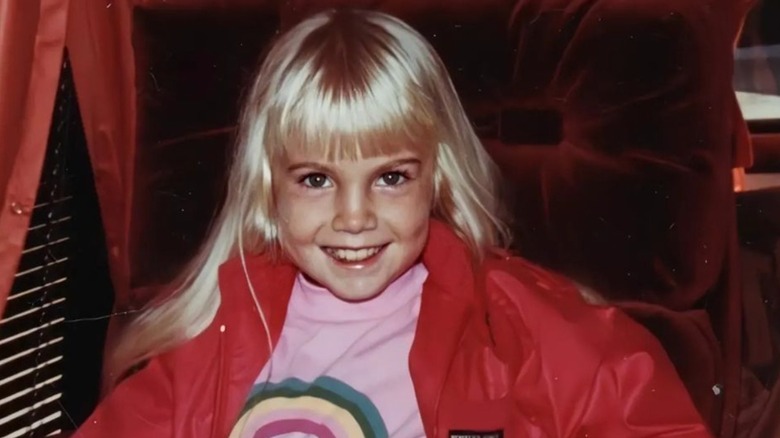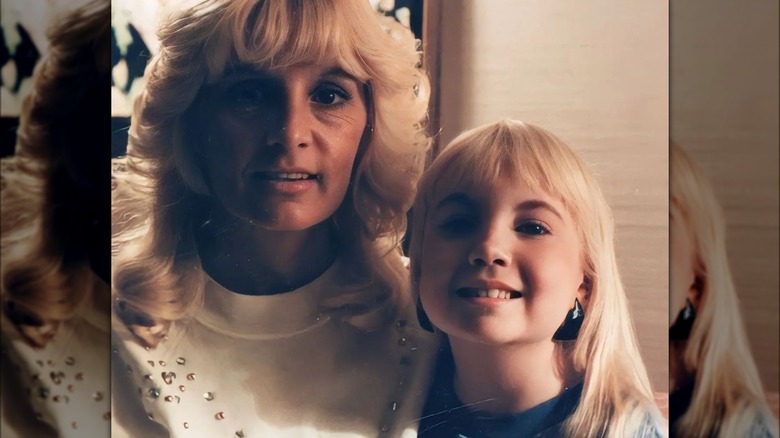The Sad Discovery Made In Poltergeist Star Heather O'Rourke's Autopsy Report
For a lot of Generation X kids, the 1982 movie "Poltergeist" was an introduction to horror films. The idea that a mischievous supernatural entity could communicate with a child through a snowy television and ultimately pull her inside somehow, into an invisible world, gave every kid pause. The movie also related the notion that a tree outside your window could get you, or the toy clown in your room could be controlled by a demonic spirit. It was enough to ensure the companies that made nightlights back then were going to stay afloat.
A lot of things stand out about Steven Spielberg's classic film, "Poltergeist," but one of the most integral to the story is that of the character Carol Anne Freeling, the little girl who was coveted by the scary spiritual entity in the family's home. She was played by a cherubic Heather O'Rourke, who also starred in two more Poltergeist sequels. It was Carol Anne sitting in front of the static-laden television, telling her family, "They're heeeeerrre," — Carol Anne's long platinum blonde hair coming out from under a football helmet as an invisible force slid her across the kitchen floor — Carol Anne, or rather, O'Rourke's voice calling for her mommy from the beyond — finding the strength to go into the light to get back to her family.
But in real life, O'Rourke did not get a scripted happy ending. Six years after the first Poltergeist came out, she died in 1988 at only 12 years old in unusual circumstances that led to her bereaved mother filing a lawsuit against the doctors who treated her.
Her death was sudden
Throughout her short life, Heather O'Rourke's parents believed that she was a fit and healthy young girl like any other. However, on January 31, 1988, the actress — who had been filming the third Poltergeist movie — suddenly became ill with flu symptoms. A similar thing had happened the previous year, with doctors telling O'Rourke's parents that their daughter had Crohn's disease, which causes inflammation in the bowel, leading to pain, digestive issues, weight loss, and fatigue. This time, however, her symptoms became far worse, when the following day O'Rourke's extremities turned blue and the actress collapsed before being rushed to hospital, where her parents were told she had suffered cardiac arrest, according to People. Though she was resuscitated and surgeons performed an operation on her bowel to fix what they now believed was an obstruction, she was pronounced dead that afternoon. O'Rourke's manager told the Associated Press: "It's weird. She was completely healthy Saturday, they thought she had the flu on Sunday, and she was dead on Monday.″
Heather O'Rourke's death was deeply shocking to many of those who knew the child actress from her star turn in "Poltergeist," and in the months after its announcement she became attached to an urban myth that claimed there was a "Poltergeist Curse," that resulted in the premature death of numerous people who worked on the horror blockbuster. However, the sad truth is that O'Rourke's death was the result of a tragic misdiagnosis.
Heather O'Rourke had an undiagnosed birth defect
According to Heather O'Rourke's death certificate, she died from a tragic combination of acute bowel obstruction, suspected septic shock, and cardio-respiratory arrest on February 1, 1988, just a few weeks after her 12th birthday. The Associated Press reported that according to one doctor, her death was "distinctly unusual," because the issue that caused the bowel obstruction was believed to have been a birth defect that would cause "a lot of (digestive) difficulties throughout her life" including nausea, vomiting, and severe abdominal pain, but O'Rourke didn't regularly experience those symptoms — however she had started having some issue which is why she was misdiagnosed with Crohn's Disease.
In May of 1988, O'Rourke's mother filed a wrongful death lawsuit against Kaiser Foundation Hospital of San Diego and Southern California Permanente Medical Group where she blamed her daughter's doctors for misdiagnosing O'Rourke. According to The Los Angeles Business Journal, the complications were the result of Intestinal Stenosis, which she was born with, but which could have been treated with surgery if only they had known, likely saving the girl's life.
Kathleen O'Rourke, Heather's mother, told People: "It was an intestinal blockage that had probably been present since birth ... The X-rays taken, if properly read, would have disclosed that this was the kind of condition that should have been treated surgically." Her attorney explained that the suit was to cover both emotional and economic loss. "We have reviewed the case extensively and we are convinced that the care we provided was appropriate," said a spokesperson from the hospital where O'Rourke received treatment. The lawsuit was later settled out of court.


